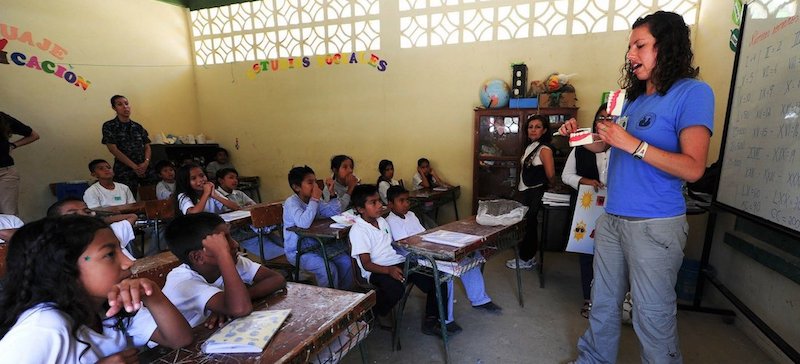If there’s one group of people who could use some of the stress-relieving benefits of yoga and mindfulness, it’s teachers. In one survey, over half of teachers reported feeling excessive stress several days a week. Over a quarter said they felt that way every day.
As with other occupations, workplace stress can lead to high blood pressure, obesity, depression, burnout, and other health problems. But teachers’ stress can also affect students’ health and even their academic performance.
Although many schools offer yoga or mindfulness classes for students — with teachers sometimes observing from the sidelines — only a few studies have looked at the benefits of yoga and mindfulness programs for teachers.
Some of the ones that have been done involved 15-day residential yoga programs for teachers, which is great for those who can attend, but may not reach that many teachers. Other studies were shorter, but didn’t measure whether teachers’ long-term anxiety or on-the-job health improved after taking a yoga and mindfulness program.
A new pilot study published this month in the journal Complementary Therapies in Medicine attempted to overcome some of those shortcomings. Researchers from the Kripalu Center for Yoga & Health and Brigham and Women’s Hospital in Boston examined the mental health benefits of a shorter yoga and mindfulness program for teachers.
Teachers’ Stress Improves With Mindfulness
Thirty-one teachers enrolled in the study, with nine attending a three-day residential yoga and mindfulness program at Kripalu known as RISE. The other 22 teachers were added to a program waitlist, the control group — these teachers took the program at a later time.
Kripalu offers RISE to K-12 schools, correctional facilities, healthcare organizations, and law enforcement personnel.
During the program teachers spent five hours each day learning yoga, sitting meditation, mindfulness practices, and breathing techniques, as well as mindful eating, communication, and sleep preparation.
Teachers who completed the RISE program showed improvements in several areas of mental health, including higher positive outlook and lower negative outlook. They also had greater mindfulness, self-compassion, work engagement, and sleep quality. This was compared to teachers on the waitlist who hadn’t taken the program yet.
Some of these improvements remained even two months after the program — lower negative outlook and greater mindfulness, self-compassion, and sleep quality. Teachers who had done the yoga and mindfulness program also had lower levels of perceived stress at this time.
Teachers who had been put on the waitlist saw similar improvements after they were able to take the RISE program.
“The results from this study provide further support for the benefit of yoga-based practices for stress reduction and improvements in psychological health and sleep quality in education professionals,” the authors wrote.
Mindfulness and Mental Health Interconnected
Earlier reviews of yoga and mindfulness programs for teachers have reported similar results, although the results were mixed. These programs also ran longer — from four to 26 weeks, which is a big time commitment for teachers while they are working. So if a three-day program can impact teachers’ stress, that’s a big deal.
One drawback of the study is that teachers were not randomized into the experimental group or the waitlist control group. So there could have been differences among the teachers in each group which led to the benefits seen in the study. However, teachers on the waitlist experienced similar benefits after they took the RISE program, so this is less of a concern.
Also, some of the teachers had taken RISE previously, which means they already had some experience with yoga and mindfulness. However, these teachers had similar mental health measures as the inexperienced teachers at the start of the current program.
The researchers wrote that this is “understandable,” because one of their earlier studies found that benefits from RISE last only for about six months. This also shows that for yoga and mindfulness programs to be effective, participants will need to continue practicing what they learn.
So how does yoga and mindfulness relieve stress in teachers? Some research suggests that yoga can reduce both stress and burnout. Mindfulness, even without yoga, has also been shown to reduce stress levels.
In the study, the researchers found that the teachers’ improvements in mindfulness were linked to improvements in perceived stress and negative outlook. Also, self-compassion improvements were linked with improvements in resilience.
Self-compassion is an important part of mindfulness training, which has its roots in Buddhism.
Jon Kabat-Zinn, who developed the mindfulness-based stress reduction program (MBSR), writes that self-compassion is needed when we practice mindfulness because there will inevitably be times when we fail to focus on the present moment, “succumbing to our own reactions and judgments.”



